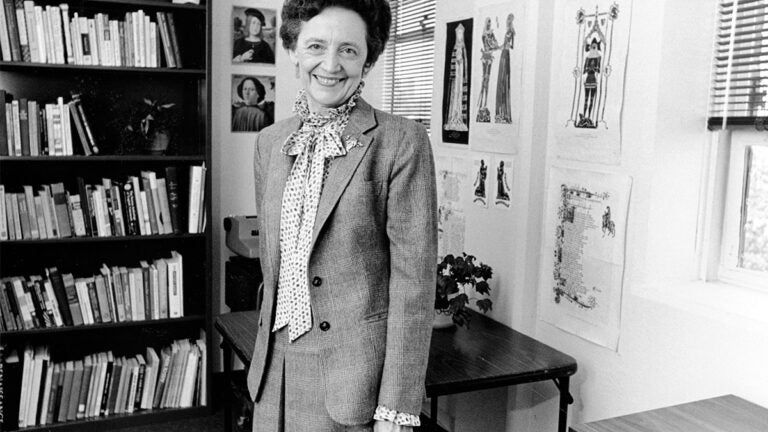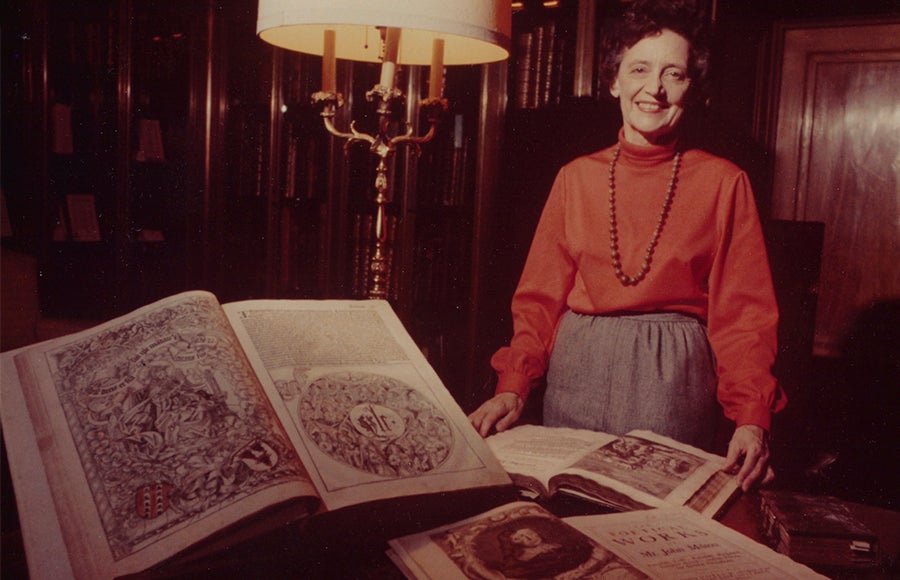
In Memoriam: Virginia Tufte
One of the most celebrated scholars of her time, Distinguished Emerita Professor of English Virginia Tufte taught at USC Dornsife College of Letters, Arts and Sciences for 25 years. Her fields of expertise were Renaissance poetry, Milton, the history and grammar of English and literature by and about women.
“Virginia Tufte was an enormously distinguished scholar whose influence was profound in two areas of English studies,” said English Department Chair David St. John, University Professor and professor of English and comparative literature. “She was also known as being a truly generous and wise mentor to both her students and younger colleagues.”
Vincent Cheng, formerly professor of English at USC Dornsife and now Shirley Sutton Thomas Professor of English and University of Utah Distinguished Professor at the University of Utah, was a grateful recipient of that mentorship. He remembers Tufte as a loyal friend.
“Virginia was a wonderful, warm, gracious and generous senior colleague. Although we worked in totally separate literary fields, I found myself gravitating towards her when I joined USC Dornsife as a young professor right out of graduate school. Virginia became my unofficial mentor, helping me navigate professional expectations and politics with sound advice, unflappable patience, and good humor.”
Tufte died peacefully on March 28 at her home in Beverly Hills, California, where she had lived for more than 60 years. She was 101 and remained remarkably lucid and strong until the end.
A precocious talent
Born Virginia James on Aug. 19, 1918, in Meadow Grove in rural Nebraska to a farming family, she started reading at 3 years old and skipped several grades at school to attend Midland College, Nebraska, in her mid-teens.
In her late teens and early 20s, she worked as a reporter for four years on The Omaha World-Herald, where she was the only woman on the paper’s city staff. She wrote features, including her memories of a day spent with Eleanor Roosevelt in 1938, a week spent among movie stars in Los Angeles in 1940, and a one-day stint in 1937 working as a maid.
In 1940, she married Edward Tufte in Omaha, Nebraska. Tufte was city engineer and public works director of Beverly Hills for many years. He died in 1999. Their son, Edward Tufte, a professor emeritus at Yale University who is noted for his work in information design and as a sculptor, was born in 1942.
After several years as a mother and homemaker, Tufte returned to higher education, earning an M.A. in journalism from Arizona State University and an M.A. and Ph.D. in English from the University of California, Los Angeles.

She joined USC Dornsife in 1964. As a woman professor at the time, Tufte was a trailblazer in her field who also championed other women academics, said her former doctoral student, friend and long-time collaborator Wendy Furman-Adams.
“A true teacher, the educator and writer Amos Bronson suggested in an 1840 essay, is not concerned with his or her ‘personal influence.’ Rather, she ‘inspires self-trust’ in her students, and guides their eyes away from herself and towards ‘the spirit that quickens them,’” said Furman-Adams, who earned a Ph.D. in English from USC Dornsife in 1983 and recently retired from Whittier College. “That is exactly what Virginia did for all her students, especially for the women: She guided each of us to find our own way as scholars and teachers and writers.”
Tufte was one of the founders of several key interdisciplinary programs at USC Dornsife, including the Joint Educational Project. She was also one of the initiators of Thematic Option and helped guide its early development into USC’s highly-regarded Resident Honors Program. She was also a founder of the program for the Study of Women and Men in Society, a predecessor of gender and sexuality studies.
She received several honors at USC, including the Justin Dart Award for Academic Innovation, the University Associates Award for Outstanding Teaching and the Raubenheimer Award for Innovative Teaching.
Professor of English Larry Green said, “The aspect of Virginia’s intellectual career that always fascinated me when first I came to USC Dornsife was how her two loves of, one, the study of Renaissance writing and, two, teaching contemporary writing, played off of one another, giving focus and insight for both pursuits, with a faith that the second could bring about a cultural revival of the first.”
A first-rate scholar
Tufte retired from USC Dornsife in 1989 but remained active, publishing a critically acclaimed book, Artful Sentences: Syntax as Style (Graphics Press, 2006), in her late 80s, an update to Grammar as Style, which was published in 1971. This earlier work developed a cult of followers in the late 20th century, several decades after it had gone out of print, prompting her to write the new book.
Following her retirement, she also published a dozen essays and wrote and produced a one-hour video-biography for educational television and classroom use about distinguished American literary illustrator Carlotta Petrina. She wrote Pieces Embroidered by Memory (Graphics Press, 2013), a memoir about her childhood in rural Nebraska and her experiences as a youthful newspaper reporter.
Carol Muske Dukes, professor of English and former California poet laureate, said Tufte should be remembered and celebrated as a first-rate scholar who brought great distinction to USC and was one of the most generous contributors to its culture.
“There is a reason why her books have a cult following on Amazon and her scholarship remains inspiring,” Muske Dukes said. “She was that kind of irreplaceable: a great teacher and a profoundly talented writer — a voice so original it defies imitation.”
A lover of ballet, opera, travel, Italian food and crossword puzzles, Tufte did not watch television, except for figure skating.
She is survived by her son.